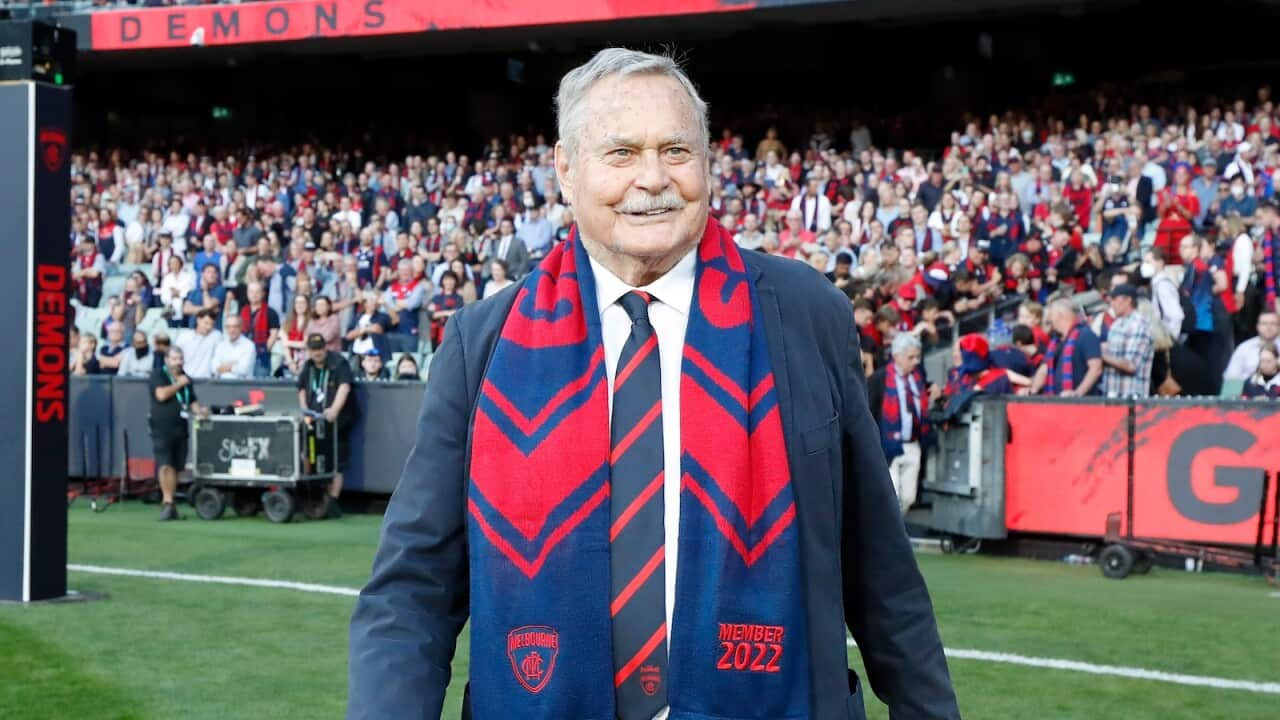Key Points
- Australian rules football icon Ron Barassi has died at the age of 87 after complications from a fall.
- Between playing and coaching, Barassi claimed 10 premierships at Melbourne, Carlton and North Melbourne.
- Barassi was the first player to be admitted into the Australian Football Hall of Fame as a "Legend".
Ron Barassi, a national sporting icon and one of the most important figures in Australian rules football history, has died aged 87.
Barassi's family confirmed the decorated former player and coach's death on Saturday.
"After a full and extraordinary life, Ronald Dale Barassi, aged 87, left us today due to complications from a fall," the statement said.
"He died peacefully, surrounded by loving family. We ask for privacy at this time."
Victorian Premier Daniel Andrews confirmed Barassi's family will be offered a state funeral to honour the Australian sporting icon.
"The word legend is used a lot. But nobody deserves it quite like Ron Barassi," Andrews said in a social media post.
"He didn't just play the game - he reshaped it.
"And how fitting that (Friday) night's game was a cliffhanger between the Dees (Melbourne) and the Blues (Carlton).
"The government will offer Ron's family a state funeral to remember him - and I hope they accept."
Barassi's death is a seismic moment in Australian sporting history.
Players and fans gave Barassi a standing ovation at Adelaide Oval and there was a short period of silence before Saturday night's Port Adelaide-GWS semi-final.
"How fitting that just last night, two clubs in which he left such an impact should play out a final that typified the toughness, ferocious competitiveness and passion that symbolised so much that was great about Ron," Carlton president Luke Sayers said.
Prime Minister Anthony Albanese said there was "no more famous name in football" than Barassi's.
AFL chairman Richard Goyder called him the game's most important figure since World War Two.
Who was Ron Barassi?
The first player to be admitted into the Australian Football Hall of Fame as a Legend, Barassi played 253 senior VFL games in his career, including 204 for Melbourne and 49 for Carlton.
Between playing and coaching, Barassi claimed 10 premierships at Melbourne, Carlton and North Melbourne.
Only fellow Melbourne Demons great Norm Smith, who coached Barassi, has as many flags in his Australian rules playing and coaching career.
In the game's history, Barassi rivals Leigh Matthews as the greatest player and coach and "Mr Football" Ted Whitten for his public profile.
Barassi is a seminal figure in the history of four clubs — as a premiership player and later coach at Melbourne, as a premiership coach at Carlton, the coach of North Melbourne's first two flags and the man who coached Sydney when the club was on its knees.

Ron Barassi was the first player to be inaugurated into the Australian Football Hall of Fame as a Legend. Source: AAP / Paul Jeffers
When his father and fellow Melbourne player Ron Barassi Snr was killed at Tobruk in 1941 during World War Two, the Demons pledged to support Barassi and his mother.
Eventually, after lobbying from Melbourne, he became one of the game's first father-son recruits and he debuted for Melbourne at 17.
When his father and fellow Melbourne player Ron Barassi Snr was killed at Tobruk in 1941 during World War Two, the Demons pledged to support Barassi and his mother.
He became one of the game's first father-son recruits and he debuted for Melbourne at 17.

A statue of Barassi was unveiled outside the MCG in 2003. Source: Getty / Quinn Rooney
He stunned the game by leaving Melbourne for Carlton after the 1964 season. Until Barassi made the move, players rarely changed clubs.
He played five seasons and 50 games for the Blues, delivering premierships in 1968 as a playing coach and in 1970 as coach.
Resuming from a two-year break from the game in 1973, Barassi moved to North Melbourne, guiding the Kangaroos to their first premiership in 1975 and another one in 1977.
Barassi returned to Melbourne as coach between 1981-1985 without success.

Barassi received a bravery award after he came to the aid of a young woman in St Kilda who was being attacked by a group of men. Source: AAP / Julian Smith
At the Commonwealth Games in 2006, Barassi "walked on water" on the Yarra River to carry the Queen's Baton, before passing it to Australian 1500m champion Herb Elliot.
In the early hours of New Year's Day in 2009, Barassi went to the aid of a woman being attacked in the street by a man who then turned on the AFL legend, .
He received an Australian Bravery Award for his actions.
Barassi married twice, first to Nancy Kellett in 1957 with whom he had a daughter and two sons; and to Cherryl Copeland in 1981.









